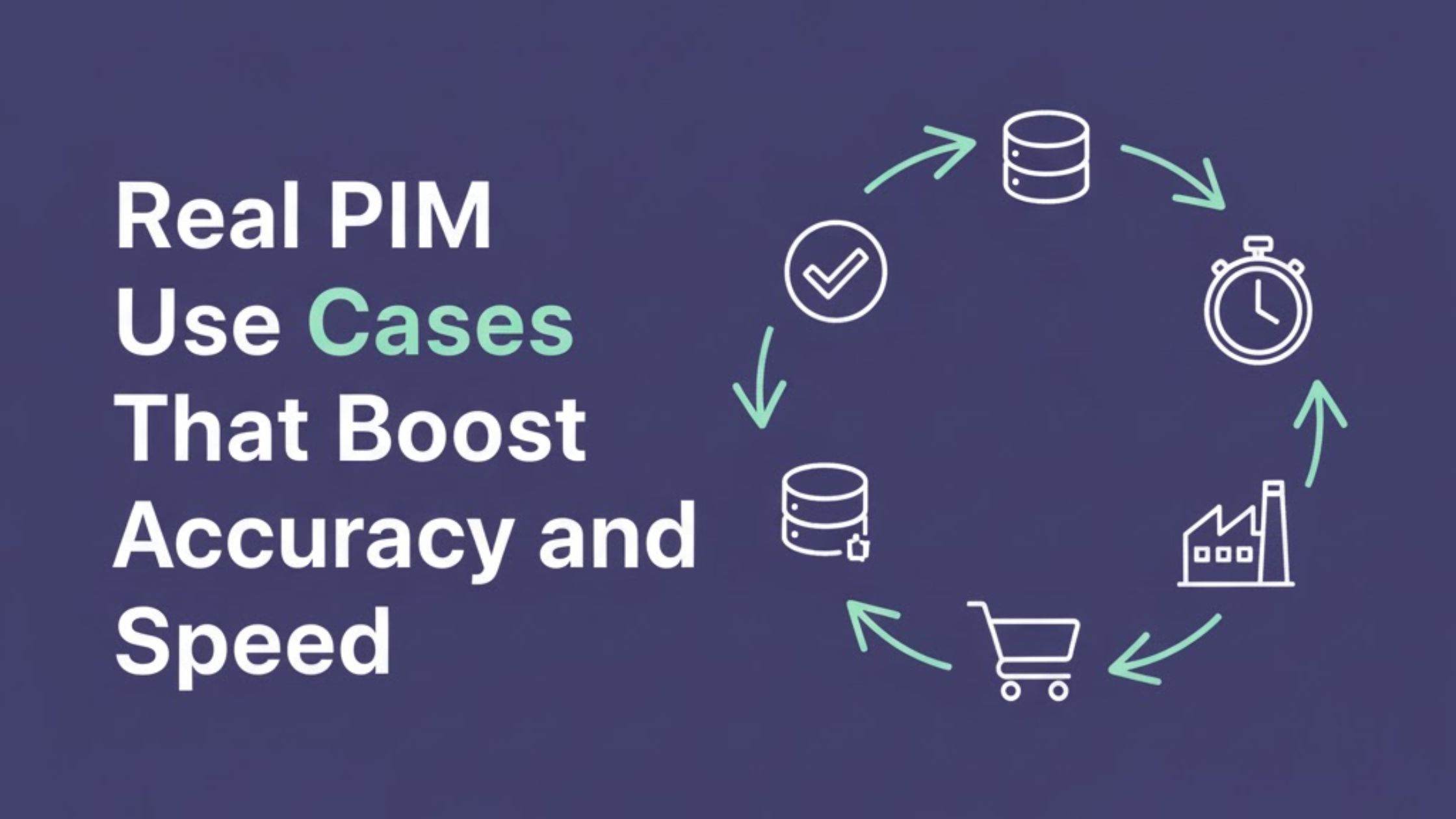What Information is Stored in a PIM System?
A Product Information Management (PIM) system is a centralized hub designed to manage and organize extensive product data. By consolidating all product-related information in one place, a PIM system ensures consistency, accuracy, and efficiency across various sales channels. Here’s a detailed look at the types of information typically stored in a PIM system:
Core Product Details
- Basic Information: This includes product names, SKUs, and short descriptions. Each product’s unique identifier is essential for inventory and catalog management.
- Attributes: Various attributes such as size, color, weight, and material specifications are meticulously managed to ensure precise product representation across platforms.
Media and Digital Assets
- Images and Videos: High-quality images and videos are crucial for e-commerce success. PIM systems store and manage these assets, ensuring they are correctly associated with the corresponding products.
- Documents: User manuals, installation guides, and compliance documents are also stored in a PIM to provide comprehensive information to customers and stakeholders.
Marketing and Sales Information
- Descriptions: Detailed product descriptions, including features, benefits, and usage instructions, are essential for marketing and sales. PIM systems facilitate the creation and management of these descriptions to enhance product listings.
- Pricing and Availability: Pricing strategies, including discounts and promotional offers, are managed within the PIM. Real-time inventory levels ensure accurate availability status across sales channels.
Localization and Multilingual Support
- Localized Content: To cater to global markets, PIM systems support multiple languages. They store translated versions of product information, ensuring consistency and relevance for international customers.
Regulatory and Compliance Data
- Compliance Information: Regulatory data, including certifications, safety information, and legal compliance documents, are stored to ensure products meet industry standards and regional regulations.
Vendor and Supplier Information
- Supplier Details: Information about vendors and suppliers, including contact details, product sourcing, and purchase history, is managed within the PIM system to streamline supply chain operations.
Customer and Market Insights
- Customer Feedback: Reviews, ratings, and customer feedback are stored to provide insights into product performance and customer satisfaction. This information helps in making informed decisions about product improvements and marketing strategies.
Benefits of Using a PIM System
Using a PIM system like Ergonode offers numerous benefits, including enhanced productivity, improved data accuracy, and streamlined operations. Here’s how a PIM system can transform your business:
- Improved Data Consistency: By centralizing product information, PIM systems ensure consistent data across all sales channels, reducing errors and enhancing customer experience.
- Increased Efficiency: Automated workflows, bulk editing tools, and real-time updates facilitate faster and more efficient management of product data, saving time and reducing manual effort.
- Enhanced Collaboration: PIM systems provide a collaborative environment where teams can work together on product information, leading to better coordination and faster decision-making.
- Scalability: As businesses grow, PIM systems can handle increasing volumes of product data and support the expansion into new markets with multilingual and localized content.
- Regulatory Compliance: Storing and managing compliance data within a PIM system ensures that products meet industry standards and legal requirements, reducing the risk of non-compliance.
Ergonode’s PIM platform, for instance, supports various industries and roles, offering tailored solutions for fashion, engineering, manufacturing, retail, and more. It provides robust features like quality control dashboards, workflow automation, and multi-channel distribution to enhance operational excellence and market reach.
For a detailed comparison of Ergonode with other PIM solutions like Akeneo, Apimio, Bluestone, and more, you can explore the Ergonode comparison pages. This will help you understand how Ergonode stands out in the PIM landscape.
How Product Information Management (PIM) Systems Enhance Business Operations
Product Information Management (PIM) systems like Ergonode are indispensable for businesses looking to streamline their operations, improve product data accuracy, and enhance customer experience. Here’s how PIM systems work and their impact on various business facets:
Streamlining Data Integration and Management
PIM systems centralize all product-related data, integrating seamlessly with existing business systems such as ERP (Enterprise Resource Planning) and CRM (Customer Relationship Management). This integration ensures that all departments access up-to-date and consistent information, reducing discrepancies and enhancing overall data integrity.
- Central Repository: A PIM system acts as a central repository where all product information is stored and managed. This includes product descriptions, specifications, images, pricing, and inventory levels.
- Data Enrichment: PIM systems enable businesses to enrich product data by adding detailed descriptions, high-quality images, and videos. This enriched data helps in creating compelling product listings that attract customers and drive sales.
Enhancing Collaboration and Workflow Efficiency
PIM systems facilitate better collaboration among different teams within an organization. Marketing, sales, product development, and supply chain teams can work together seamlessly, ensuring that everyone is on the same page regarding product information.
- Workflow Automation: Automating workflows within a PIM system reduces manual tasks, speeds up product data updates, and ensures that all necessary approvals are obtained before product information is published.
- Real-Time Collaboration: Teams can collaborate in real-time on product data, making updates and changes visible immediately to all stakeholders. This feature is crucial for maintaining data accuracy and consistency across all channels.
Improving Market Reach and Customer Experience
By ensuring that product information is accurate and consistent across all sales channels, PIM systems enhance customer experience and expand market reach.
- Multi-Channel Publishing: PIM systems enable businesses to publish product information across multiple sales channels, including e-commerce platforms, marketplaces, and physical stores, ensuring consistency and accuracy.
- Localization and Multilingual Support: With built-in localization and multilingual support, PIM systems allow businesses to cater to international markets by providing product information in multiple languages.
Facilitating Regulatory Compliance and Faster Market Entry
PIM systems help businesses comply with industry regulations and standards by storing all necessary compliance data and documentation in one place.
- Compliance Management: Storing regulatory and compliance information within the PIM system ensures that products meet industry standards and legal requirements, reducing the risk of non-compliance.
- Faster Product Launches: By streamlining product data management and automating workflows, PIM systems enable faster product launches, helping businesses stay competitive and respond quickly to market changes.
Key Features of Ergonode PIM
Ergonode offers a robust PIM platform with features designed to enhance productivity and efficiency. Here are some of its key features:
- Auto-Generation of Content: Ergonode’s AI-powered content generation saves time by creating product descriptions based on selected attributes, reducing the need for manual input.
- AI-Powered Translations: Automatically translate product information into multiple languages, facilitating rapid entry into new markets and ensuring consistent product data across regions.
- Bulk Editing Tools: Manage large volumes of SKUs efficiently with Ergonode’s bulk editing capabilities, ensuring data accuracy and consistency.
- Quality Control Dashboards: Maintain high data quality with dashboards that provide insights into data accuracy and consistency.
- Workflow Automation: Streamline operations from data entry to distribution, reducing manual tasks and speeding up product information updates.
- Multi-Channel Distribution: Seamlessly publish product data across various e-commerce platforms, catalogs, and retail partners, ensuring consistent and accurate product information.
For more detailed comparisons of Ergonode with other PIM solutions and to understand its unique advantages, you can explore the Ergonode comparison pages.
Industry-Specific Solutions and Use Cases
Ergonode’s PIM platform is tailored to meet the needs of various industries, offering specific features and benefits for each:
- Fashion: Ensures brand consistency across online and offline channels, enhancing the customer experience and supporting marketing efforts.
- Engineering: Streamlines product data processes, making it easier to manage complex product specifications and compliance requirements.
- Manufacturing: Transforms product data into a powerful business asset, improving operational efficiency and market growth.
- Retail: Enhances product data synchronization across multiple sales channels, improving market reach and customer satisfaction.
- Food & Beverage: Optimizes product information management for the food and beverage industry, ensuring compliance with regulatory standards and improving product listings.
For a comprehensive understanding of how PIM systems work and their benefits, you can read more about the importance of PIM in the digital world and how to implement a PIM platform.
By leveraging a PIM system like Ergonode, businesses can significantly enhance their product data management processes, improve collaboration, and achieve faster market entry, ultimately driving growth and profitability.







